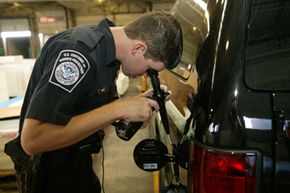Don't Bring These Items Across the Border
Prohibited and Restricted Items are items that you are forbidden to bring into the U.S. Examples include drug paraphernalia (unless you have medical permission for its use), illegal substances (including medications that are not legal in the U.S. or not sold without a doctor's prescription) and counterfeit products.
The list of restricted items is long and extensive. Some of them include:
Advertisement
- Food products: Bakery goods and certain cheeses are allowed into the U.S. Some imported foods are also subject to requirements of the U.S. Food and Drug Administration (FDA).
- Fish and wildlife, and products made from them: These are subject to state laws, import and export restrictions, prohibitions, permits or certificates as well as quarantine requirements. For details, contact the U.S. Fish and Wildlife Service (FWS) before you leave if you plan to bring back any wild birds, land or marine mammals, reptiles, fish, shellfish, mollusks or invertebrates or parts of these (such as feathers, bones or fur) or products made from these parts (such as ivory combs or tortoiseshell boxes). FWS must be apprised of products made from endangered species and must issue permits to import them. If the ivory product is made from a warthog or is at least 100 years old, it can be imported as long as this can be documented. The U.S. Fish and Wildlife Service can be reached at 1-800-358-2104. These items are dealt with only at certain customs entry ports, so contact CBP for a list.
- Plants or plant products: Every seed, cutting and plant must be declared and brought out for inspection no matter how clean or pest-free they may appear. Many require import or export permits, and some are completely forbidden.
- Drugs and medications: The FDA forbids the importation (either on your person or by mail) of medications, narcotics or devices that it has not approved for use in the United States or is approved for use only with a doctor's prescription. These include nontraditional treatments for cancer, AIDS, arthritis or other medical conditions. These items will be confiscated even if you acquired them through a foreign doctor's prescription.
For the complete restricted list, which ranges from dog and cat fur to Haitian animal hide drums, visit the U. S. Customs and Border Protection Web site.
Also, U.S. law forbids Americans to bring in goods from countries on which travel restrictions are in place, such as Cuba, Iran, Burma (Myanmar) and most of Sudan. The only exception is informational materials (such as books, tapes, recordings or films). If you have been granted government permission to travel to these countries and would like to bring back some things, you'll need a specific license (rarely granted) from the Office of Foreign Assets Control.
It's important to know that most countries have laws to protect their cultural property, such as art, antiquities and artifacts. These laws include export controls and national ownership of cultural property. Even if you bought a piece from a store in that country, you may be asked to prove that you own it before you can bring it back into the United States. While it's important to have export permits and receipts, these provide no guarantee of ownership [source: U.S. Customs and Border Protection].
Although foreign laws may not be enforceable in the U.S., certain U.S. laws, such as the U.S. National Stolen Property Act, may apply. Under this federal law, a person cannot legally own artifacts or art objects that were stolen, no matter how many times the items may have changed hands [source: U.S. Department of Justice].
